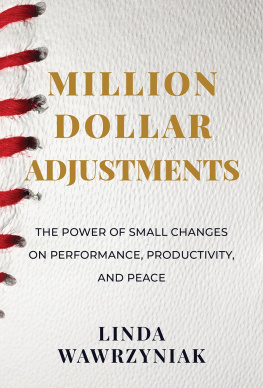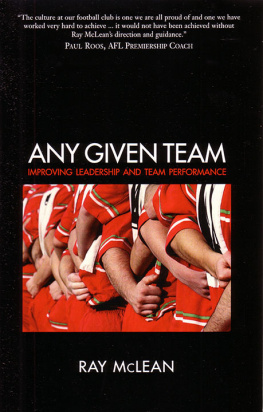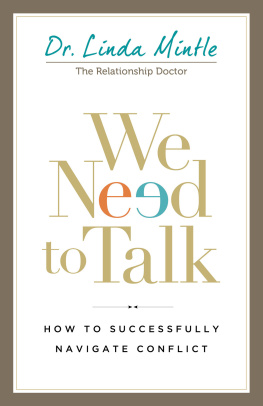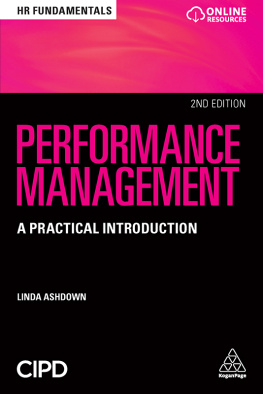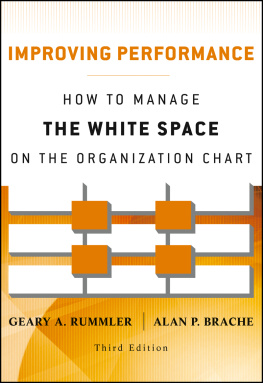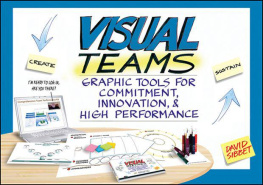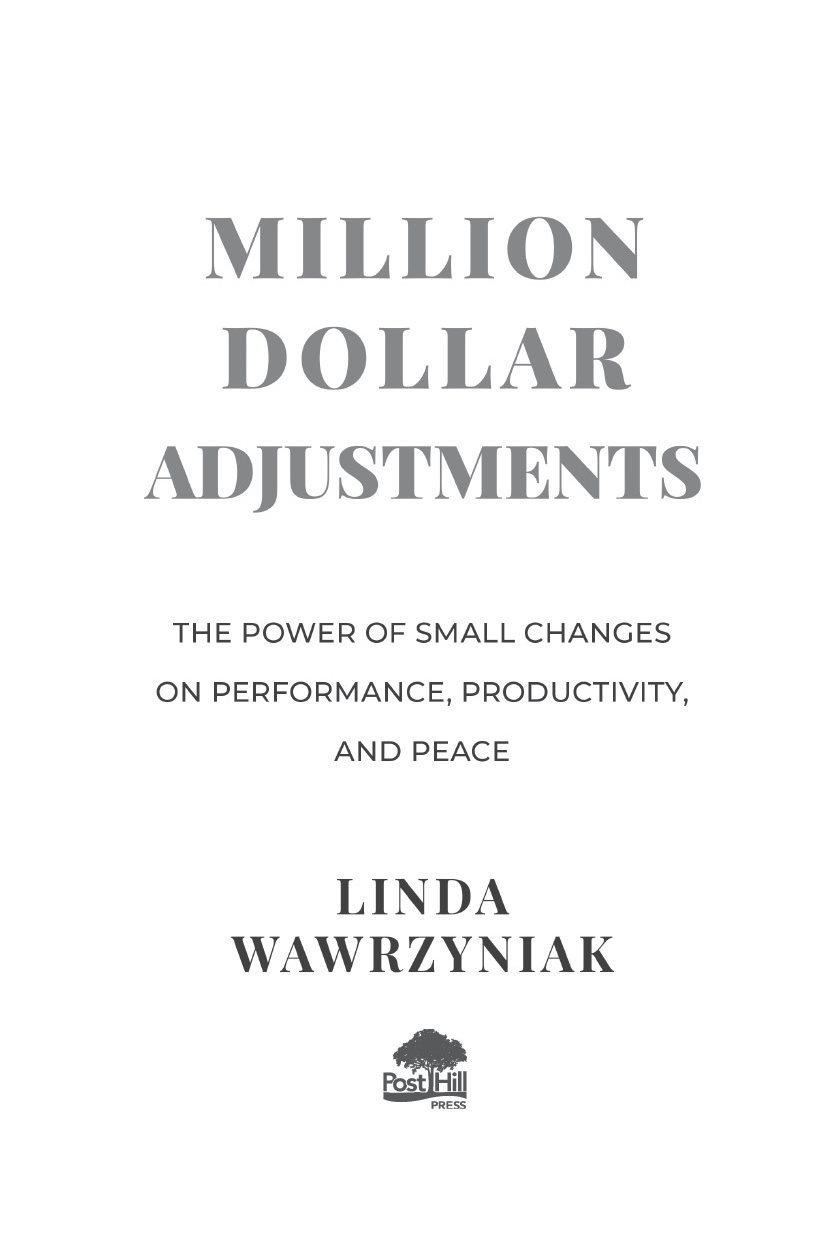Advance Praise for
Million Dollar Adjustments
I loved this book! It was a great way to look at disruption and change, breaking down learning opportunities and how to remove barriers to success. A very good read.
Ozzie Guilln Jr., Producer of Being Guilln , Host of La Vida Baseball
An inspiring and timely message packed with powerful tools, Million Dollar Adjustments provides a blueprint to achieve goals as well as navigate inevitable change and uncertainty without stress or anxiety. This is a book this generation needs.
Jordan Lee Dooley, Wall Street Journal Bestselling Author of Own Your Everyday
The Adjustment Awareness Audit is a genius tool for anyone in any industry. In just a couple of chapters, I discovered so much about my own adjustment stylemore than I ever thought I would! This book is a must-read.
Elizabeth Loutfi, Managing Editor, Chief Learning Officer
Our lives are constantly being challenged, questioned, and thus prone to change. As an artist, I feel its extremely important to keep current and make adjustments or we risk not connecting, becoming stagnant, or worse, simply irrelevant. This book will help anyone become a climber and not merely a camper and so I highly recommend it. If we dont evolve, we could dissolve.
Michael Tait, Newsboys
A POST HILL PRESS BOOK
Million Dollar Adjustments:
The Power of Small Changes on Performance, Productivity, and Peace
2021 by Linda Wawrzyniak
All Rights Reserved
ISBN: 978-1-63758-016-5
ISBN (eBook): 978-1-63758-017-2
Cover art by Tiffani Shea
Interior design and composition by Greg Johnson, Textbook Perfect
Although every effort has been made to ensure that the personal and professional advice present within this book is useful and appropriate, the author and publisher do not assume and hereby disclaim any liability to any person, business, or organization choosing to employ the guidance offered in this book.
No part of this book may be reproduced, stored in a retrieval system, or transmitted by any means without the written permission of the author and publisher.

Post Hill Press
New York Nashville
posthillpress.com
Published in the United States of America
Printed in Canada
Contents
I never blame myself when Im not hitting. I just blame the bat and if it keeps up, I change bats.
YOGI BERRA
R afi looked at me with big brown eyes, waiting for me to say something that would ease his deepest worries and greatest fears. I wasnt his boss, and I had no power whatsoever to give him assurance about anything, but here he was, seeking it: the magical words that would assure him he was not about to lose his job. But I had none to offer.
Even though I tried my best to come up with an impactful pep talk, it was off. Way off. Even as the words were coming out of my mouth, I knew that I had failed him. He was only twenty years old, miles away from his home country, unable to speak fluent English, and about to lose the only sense of financial security he had. While I didnt have the power to determine his job status, I could have helped him work through it and maybe even turn it around. But back then, I just didnt know how.
I wasnt even planning on talking with Raphael that day after English class. I didnt know that he would come up and ask to talk to me after all the guys had left. Putting away the class materials as usual, I realized he needed help only when he approached with a sad look in his eyes.
Standing at six foot three, Raphael, or Rafi for short, was a right-handed pitcher for a Class A professional baseball team. He was from the Dominican Republic, and I was helping him and his Spanish-speaking teammates learn English. His heart was heavy when he approached me and, in his broken English, said, I not pitching good, teacher.
I knew instantly where he was going with this. When a player is in a consistently poor pattern of performance, he doesnt have much time to turn it around. Performance is constantly being monitored in professional sports, and players like Rafi must make adjustments within a short amount of time and improve or risk being cut from the team.
Raphael feared this was his imminent fate because he knew his performance wasnt as good as it should be. Being released is a real concern for players, especially in the minor leagues. This means they will not have an income or have a chance at their dream of making it to the big leagues. In addition, they feel as if they have failed themselves and their families, who believe this is their only opportunity for a better life.
I have seen many strong, grown men break down and cry after they have been released from playing baseball. It is very, very deep for them because, for many, its all they know. Its what they love. Its their passion and sometimes their identity. For players from developing countries like the Dominican Republic, professional baseball is their ticket to feed their families, elevate their community, and lift them out of poverty. Most dont have an education or something else to fall back on. So when I see someone cry out of what the loss from failure brings, my heart breaks.
In those moments, we all seek out someone to turn our descent around, to help us regain our confidence or correct our course. I was Raphaels person. At that moment, my thoughts raced. What do I say to help him? After asking him if he had talked with his coaches and hearing him repeat their standard replies, I tried telling him a motivational story and made some analogy about how iron is refined by fire to remove impurities in the metal. Even though he was in the heat right now, I assured him he would come out stronger on the other side.
Rafi was released a week later.
Striking Out
My heart sank when I heard that news. Rafis pitching never got back to the level it needed to, and the team decided that his time trying to get it there was up. Coaches and trainers know that unless theres an injury and the body isnt working properly, underperforming generally results from a problem of the mind. Rafi didnt have a way to unblock his failure and make the appropriate adjustments on the field. He didnt have someone available like this on the team who also understood the multicultural challenges of international players.
Thinking back to that day in class, I still feel partially responsible because I didnt have the right tools to draw from and help him in this situation. I was using old, partially developed tactics that I had stored in the back of my mind from somewhere in my past. These tools werent the right ones for this situation. Maybe they were never the right ones, but they were the only ones I had at the time.
When I was growing up in my Latin American household, we had our share of failure but rarely talked about it much because it was too uncomfortable and hard. When failure in myself or my siblings did erupt into tears of anger or frustration, we comforted each other the best we could, which helped us keep going but didnt address the cause of our distress. It was a warm, validating approach, but something was clearly missing.
Years later, I noticed that, as a wife and parent, I tended to fall back on the old methods I learned as a child. When my kids failed, there were pep talks, comforting embraces, and suggestions on what to do next time. But I had no real understanding of why they failed and assumed it was due to a lack of knowledge, maturity, or experience in that situation.

